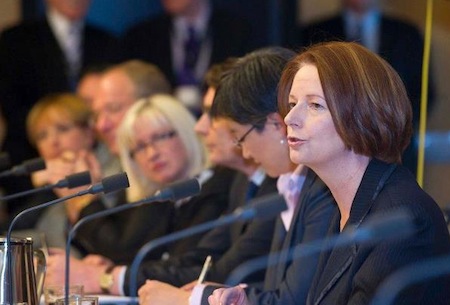It’s not just American politicians who have a hard time dealing with illegal immigration.
Unravelling stability in Afghanistan, where the United States has led an 11-year military effort, may be exacerbating a rise in boat-bound refugees to Australia, causing headaches for its Labor-led government.![]()
![]()
![]()
Australian prime minister Julia Gillard yesterday announced that her government would seek to enact the recommendations of a nonpartisan review and adopt a version of the ‘Pacific Solution’ adopted by Labor’s predecessor Liberal government of John Howard — Gillard has called on Australia’s parliament to pass a new law allowing for the reopening of detention centers on Nauru and on Manus Island in Papua New Guinea within as soon as a month.
The move will result in a return to offshore processing for asylum-seekers trying to arrive by boat to Australia. That means that such refugees would face years of detention in Nauru or PNG if apprehended by Australian authorities at sea.
It’s a 180-degree turnaround for Labor, although Gillard had promised (during her latest interparty leadership contest with former prime minister Kevin Rudd in February) to reverse what’s been a five-year upswing in illegal arrivals by sea to Australia — and a correspondingly higher number of refugee deaths. So although Gillard may be weakened by the sudden turn, it’s an issue that’s long been a political albatross for her and for Labor. When Labor returned to power in 2007 under Kevin Rudd, the party quickly scrapped the ‘Pacific solution’ by enacting what Rudd considered more humane policies, closing the Nauru and PNG detention centers in favor of onshore processing centers.
The key question over the past five years is why the number of refugees by boat rose so dramatically in 2007 — proponents of the Pacific Solution, such as Liberal/National Coalition leader Tony Abbott, argue that the leniency of Labor asylum policies encouraged more refugees to arrive by sea. Abbott supports the return to using offshore detention, has harshly criticized Labor policy for resulting in over 600 refugees deaths by drowning, and is today crowing over Gillard’s reversal:
“I’ve been saying for four years that the Prime Minister should pick up the phone to Nauru,” says the Opposition Leader.
“We have had enormous cost, untold tragedy and trauma that could have been avoided if the Prime Minister had been prepared to do this at any time in the last four years,” says Tony Abbott.
“We’ve had 22,000 illegal arrivals, almost 400 illegal boats.”
Although many of the refugees come directly by boat from Indonesia or Malaysia, asylum-seekers often begin their journey from throughout greater Asia, including China, Vietnam, Iraq, Iran and Afghanistan. Even under the Pacific Solution, most refugees who arrived by boat were bona-fide refugees and around two-thirds were either granted asylum in Australia or resettled in other countries.
Opponents of the Pacific Solution, such as former prime minister Malcolm Fraser, say that the number of refugees rose due to external factors. Fraser, a former Labor prime minister of Australia from 1975 to 1983, yesterday called Gillard’s propsed approach ‘racist’:
Fraser said the proposals would not stop the boats and that more people would be at risk of drowning. ”The Liberals and others say that Howard stopped the boats, but if you look overall at what happened, the Taliban fell. The numbers of refugees going to Europe fell just as dramatically at the same time and no country in Europe had yet introduced the punitive measures that Australia introduced.”
The sensible alternative was to have large processing centres, in Malaysia or Indonesia, with the commitment that those recognised as refugees would come to Australia.
Fraser and critics point to the indefinite periods of detention — including for children — that asylum-seekers would face in Nauru and in PNG, and they criticize the human rights abuses that have been alleged to occur in the offshore detention centers. Nauru, in particular, had previously not been a signatory to the United Nations Convention Relating to the Status of Refugees, but signed the convention in 2011.
Most recently, after a 2010 incident where 50 asylum-seekers died when their boat crashed on the coast of Christmas Island, an Australian territories, Gillard had tried to pursue new options. She introduce a “Malaysia solution” that would have swapped 4,000 refugees, assessed as refugees in Malaysia, for 800 asylum-seekers arriving by boat in Australia. In August 2011, however, the High Court — Australia’s supreme court — ruled down the Malaysia solution as unlawful. There were other problems with that approach too, though, because Malaysia is also not a signatory (not even today) of the U.N. convention for refugees, and there were reports of caning and other human rights violations there as well.
Earlier in June, two additional boats capsized just north of Christmas Island, killing another 90 people.
Gillard, despite her backtracking, called the Rudd-era policies “history,” but the leader of the government in the Senate, Chris Evans, who implemented the policies as Rudd’s immigration minister, stood by the earlier Labor attempts:
“I did take great pleasure in abolishing the Pacific Solution,” he told the Senate yesterday. “It was a regime based on punishment and trying to convince people that if you hurt them, they will stop.”
Rudd, who served as prime minister until his ouster in 2010, and who served as Gillard’s foreign minister until February, when they faced off in a leadership contest, has been uncharacteristically quiet about Labor’s volte-face, but is on record from the February leadership contest arguing that Gillard cannot win the next general election, due in 2013.

2 thoughts on “Gillard’s 180-degree turn and what it means for Australian asylum policy”